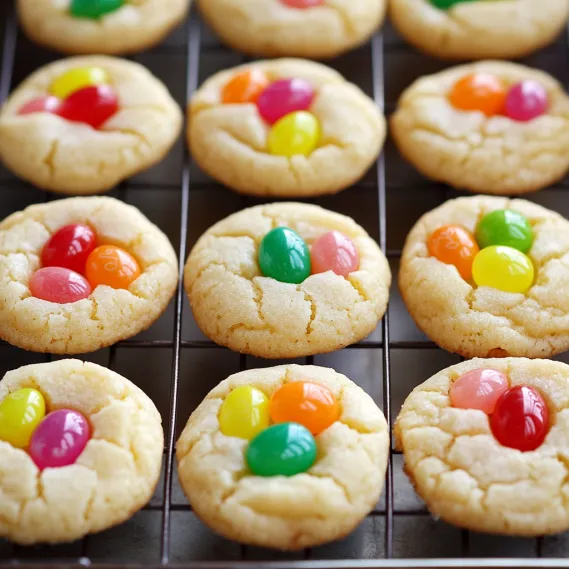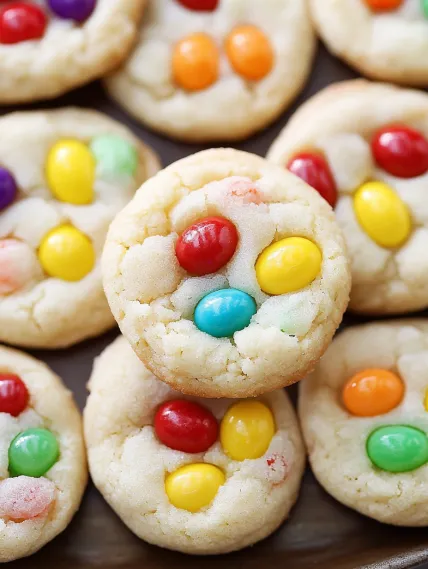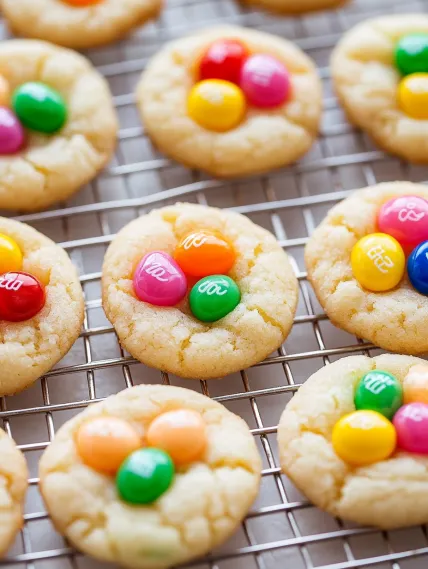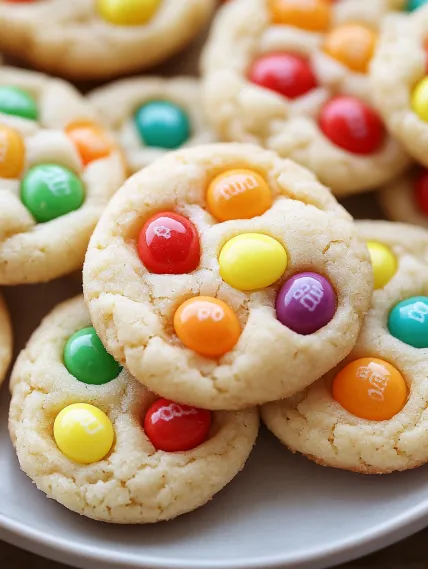 Pin
Pin
These charming Jelly Bean Sugar Cookies deliver pure spring joy in every bite – soft, buttery cookies with perfectly crisp edges provide the ideal canvas for colorful jelly beans that add both whimsical visual appeal and bursts of fruity sweetness. The simplicity of these drop cookies belies their delightful impact, requiring no special equipment or complicated techniques, just a few basic ingredients that transform into a festive Easter treat. Whether you're looking for a quick dessert to round out your holiday table or a fun baking project to enjoy with little helpers, these cookies strike the perfect balance between ease and impressive results.
I first made these cookies for an impromptu Easter gathering when I needed something festive but didn't have time for complicated decorating. They were such a hit that they've become a tradition – with guests of all ages delighted by their cheerful appearance and delicious taste. What I love most is how these simple cookies bring a smile to everyone's face, proving that sometimes the most straightforward recipes create the most joy.
Essential Ingredients and Selection Tips
- Butter: Use unsalted, room temperature butter for the best texture and flavor control.
- Sugar: Regular granulated sugar creates the perfect sweetness and helps with that slight crispness around the edges.
- Vanilla and Almond Extracts: This combination provides depth of flavor that elevates simple sugar cookies. Pure extracts deliver the best taste.
- Flour: All-purpose flour gives these cookies their perfect structure – measure carefully by spooning and leveling.
- Jelly Beans: Choose smaller-sized jelly beans in spring colors. "Just Born" brand works particularly well, but any variety you enjoy will be perfect.
I've discovered that the combination of vanilla and almond extracts creates magic in these simple cookies. While you could use vanilla alone, the hint of almond adds a bakery-quality flavor that makes people wonder what your secret ingredient might be.
Detailed Cooking Instructions
- Step 1: Prepare The Perfect Dough
- Beat 1 cup softened unsalted butter with 1½ cups granulated sugar until light and fluffy, about 2-3 minutes. Add 2 eggs, 1 teaspoon vanilla extract, and ½ teaspoon almond extract, beating until well combined. In a separate bowl, whisk together 3 cups all-purpose flour, 2 teaspoons baking powder, and ½ teaspoon salt, then gradually mix into the wet ingredients until just combined.
- Step 2: Shape Before Chilling
- Using a tablespoon cookie scoop or measuring spoon, portion the dough into balls about 1 tablespoon each. Roll each portion between your palms to create smooth, round balls. This step before chilling makes handling the dough much easier, as it becomes quite firm when cold. Place the dough balls on a plate or small baking sheet that will fit in your refrigerator.
- Step 3: Chill For Perfect Texture
- Refrigerate the dough balls for 1-2 hours. This chilling time is crucial as it prevents the cookies from spreading too much during baking and helps develop their flavor. While you might be tempted to skip this step, especially with busy holiday preparations, it truly makes the difference between flat cookies and perfectly shaped ones.
- Step 4: Bake To Golden Perfection
- Preheat your oven to 350°F and line baking sheets with parchment paper. Place the chilled dough balls about 2 inches apart on the prepared sheets. Bake for 10-12 minutes, just until the edges begin to turn golden but the centers still appear slightly underdone. They'll continue to set as they cool, resulting in perfectly soft centers.
- Step 5: Add The Festive Touch
- Remove cookies from the oven and allow them to cool for about 2 minutes on the baking sheet. While they're still warm but not hot, gently press 2-3 jelly beans into the top of each cookie. The warmth of the cookie will help the jelly beans adhere. Allow the cookies to cool completely on the baking sheet for 5 minutes before transferring to a wire rack.

I learned through experimentation that timing matters when adding the jelly beans. If the cookies are too hot, the jelly beans might melt slightly; if too cool, they won't adhere properly. The sweet spot is about 2 minutes after removing from the oven, when they're still warm enough to bond with the candy but won't cause melting.
The Secret To Perfect Wok Technique
High heat is essential for authentic fried rice. My grandmother taught me to heat the wok until smoking before adding oil. Keep ingredients moving constantly to achieve that elusive "wok hei" flavor. Never overcrowd the pan—cook in batches instead. This technique transformed my fried rice into restaurant-quality perfection.

Making The Most Of Leftovers
This dish excels at transforming leftovers into something exciting. I've used roast chicken, holiday ham, and even Thanksgiving turkey with great success. Cut meat into uniform pieces that distribute evenly throughout. Leftover grilled steak adds incredible depth with its smoky edges. Even roasted vegetables bring delightful caramelized sweetness.
Balancing Flavors And Textures
Special fried rice succeeds through balanced components. Char siu provides richness, prawns add sweetness, eggs contribute silkiness, while vegetables offer freshness. The sequence matters—aromatics first build flavor, eggs midway remain distinct, vegetables maintain crispness. Adding spring onions last preserves their brightness for that authentic restaurant finish.
Customization For Dietary Needs
This dish adapts easily to dietary restrictions. For vegetarians, I omit meat, double eggs and add extra vegetables. Low-carb diners enjoy my cauliflower rice version that carries flavors beautifully. For gluten-sensitive guests, tamari replaces soy sauce while ensuring chicken powder is certified gluten-free. Everyone enjoys this beloved dish regardless of restrictions.
Creative Variations For Every Season
While these cookies shine as an Easter treat with pastel jelly beans, I've adapted them for celebrations year-round. For Christmas, I use red and green jelly beans or swap in small red and green M&Ms. Halloween calls for candy corn pressed into orange-tinted dough. Valentine's Day cookies feature pink and red heart-shaped sprinkles or candies. The versatility of this base recipe makes it a go-to for every holiday. My niece's birthday party featured cookies with jelly beans matching her party colors – they disappeared faster than the birthday cake! I've even created "back to school" versions with primary-colored candies that were perfect for lunchboxes.
Perfect Pairing Suggestions
These cookies shine on their own but also work beautifully as part of a larger Easter dessert spread. I serve them alongside fresh fruit for a lighter option that balances the sweetness. For an Easter dessert table, they complement more elaborate offerings like carrot cake or lemon tarts by providing a simpler option that appeals especially to children. I've found they pair wonderfully with tea or coffee for adults, while children naturally gravitate to milk. During Easter brunch, I sometimes include them on a dessert board with chocolate eggs, coconut macaroons, and fresh berries for a beautiful and varied sweet selection.
Kids In The Kitchen
This recipe has become one of my favorites for baking with children, especially around Easter. The dough is forgiving enough for little hands to help shape the balls, and pressing jelly beans into the warm cookies is a task that even toddlers can manage with supervision. My five-year-old nephew takes great pride in arranging the jelly beans in patterns – some cookies get all one color, others are carefully arranged rainbows. I've found this recipe creates not just delicious cookies but cherished memories of holiday baking together. The straightforward nature of the recipe builds confidence in young bakers while the colorful results keep them engaged throughout the process.

These Jelly Bean Sugar Cookies have become my Easter signature – a simple recipe that delivers both visual appeal and delicious taste without complicated techniques or specialty ingredients. What makes them truly special is how they bring joy to both the baker and those enjoying them. In a season that often involves elaborate meals and complicated traditions, there's something wonderfully refreshing about a straightforward cookie that captures the colorful spirit of spring while allowing you to focus on what really matters – spending time with those you love.
Recipe FAQs
- → Can I use different extracts instead of almond extract?
- Yes, you can substitute the almond extract if you prefer a different flavor or have allergies. Vanilla extract can be increased to 1 teaspoon total instead of using almond extract. Other good options include lemon extract for a citrusy cookie, coconut extract for a tropical twist, or butter extract for an extra buttery flavor. Each will create a slightly different but equally delicious cookie. If using stronger extracts like peppermint, reduce to 1/4 teaspoon.
- → Why do my cookies spread too much when baking?
- If your cookies are spreading too much, there are several likely causes: 1) The dough wasn't chilled long enough - make sure to chill for at least 1-2 hours; 2) The butter was too warm when you made the dough - it should be softened but still cool to the touch; 3) Too much sugar or not enough flour - make sure to measure ingredients precisely; 4) The baking sheet was warm when you placed the dough balls on it; or 5) Your oven temperature might be running low. For the best results, use cold dough on a room temperature baking sheet in a properly preheated oven.
- → What types of jelly beans work best for these cookies?
- Any jelly beans will work for these cookies, but there are a few considerations: 1) Traditional smaller jelly beans (like Just Born brand) are ideal as they're not too heavy and won't sink into the cookies; 2) If using larger gourmet jelly beans, you might want to press them in a little less firmly; 3) For a more cohesive color scheme, you can sort and use just certain colors; 4) Avoid using extremely soft jelly beans as they might melt too much in the warm cookies. The flavor of the jelly beans is less important since they're primarily a decorative element.
- → Can I add the jelly beans before baking the cookies?
- It's not recommended to add the jelly beans before baking. Jelly beans will likely melt, burn, or become very hard if baked with the cookies. The best approach is to bake the cookies first, let them cool for exactly 3 minutes (still warm enough to be pliable but firm enough to hold shape), then gently press the jelly beans into the tops. This timing is crucial - too hot and the jelly beans might melt, too cool and they won't adhere properly to the cookies.
- → How do I know when these cookies are properly baked?
- These sugar cookies can be tricky to judge for doneness because they should be very pale when properly baked. Look for these signs: 1) The edges should be just barely beginning to turn golden; 2) The centers will still look soft and slightly underdone; 3) The bottoms should be light golden when you lift one with a spatula. If you wait until they look fully done, they'll likely be overbaked and crunchy rather than soft. They typically take 10-12 minutes at 350°F, but start checking at 9 minutes as oven temperatures can vary.
- → Can I make these cookies for other holidays besides Easter?
- Absolutely! These versatile cookies can be adapted for many holidays or occasions by changing the color scheme of the jelly beans: 1) Red, white, and blue jelly beans for Fourth of July; 2) Red and green for Christmas; 3) Orange and black for Halloween; 4) Team colors for sports events; 5) Match a birthday party color theme; or 6) Use conversation heart candies instead of jelly beans for Valentine's Day. The base cookie remains the same - just switch up the decorative elements to suit the celebration.
